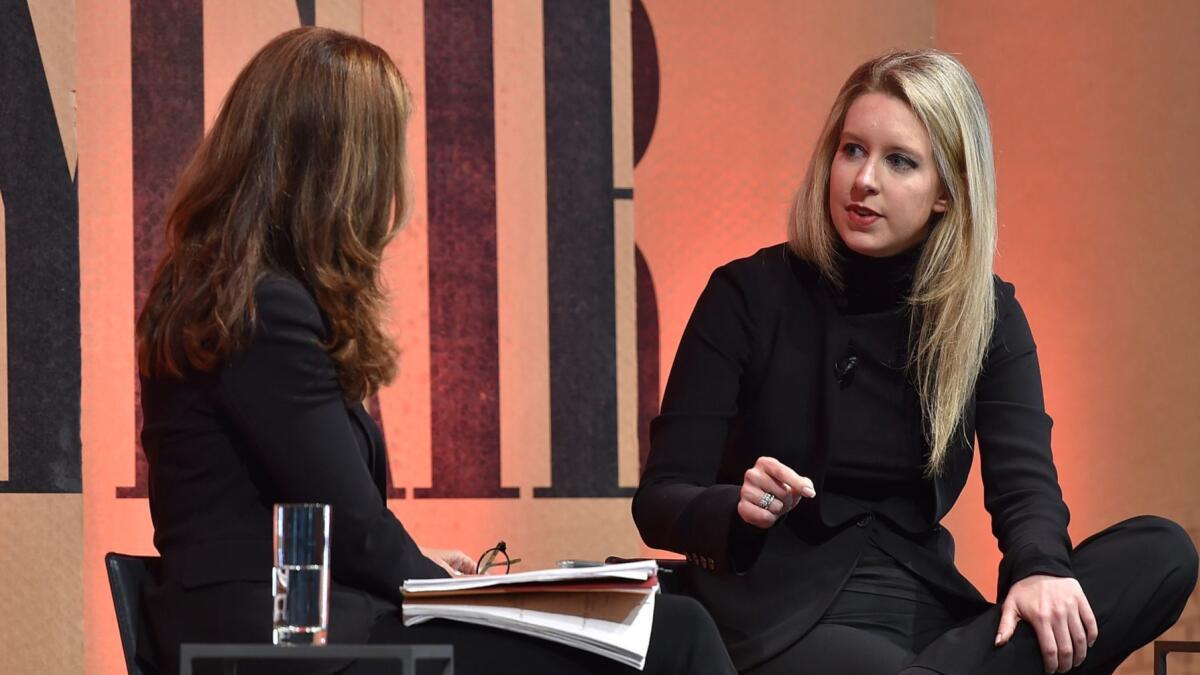Column:: The SEC lowers the boom on Theranos — but there are more companies like Theranos out there

The Securities and Exchange Commission on Wednesday wrote what may be the final chapter in the book of Theranos.
That’s the Silicon Valley darling that claimed to have developed a new device that would transform the business of blood testing. In fact, the SEC said, Theranos was “a massive fraud” that cheated investors of $700 million over a period of years. Its 34-year-old founder, Elizabeth Holmes, will pay a $500,000 penalty, cede her control of the company, and be barred from serving as an officer or director of a public company for a decade.
Yet buried within the SEC’s legal complaint, filed in federal court in San Jose, are indications that there may be many more companies just like Theranos still collecting money from investors — firms with an intriguing pitch, a credulous media claque, a business plan that makes secrecy sound like a virtue, and an appealing leader with unassailable corporate control.
Not all these companies are engaged in fraud, mind you. But many are traps for unwary investors — even ostensibly savvy and experienced investors.
Many also are empowered by the lax regulations in the capital markets, some of which have been mandated by Congress, and some the result of a permissive attitude by securities exchanges eager to attract new companies as issuers.
Take the 2012 JOBS Act, in which Congress pared back disclosure requirements for “emerging growth companies,” defined as those with less than $1 billion in revenues in their latest fiscal year. The act allows these companies to provide the public with skimpier audited financial data and information about executive pay than bigger companies must submit.
The act also allows these companies to file confidential securities registration statements prior to their initial public offerings. Standard registration statements are public as soon as they’re filed, so potential investors can witness “the back-and-forth process between the SEC and the company, which can reveal important information,” according to a 2015 study by researchers at Columbia University.
They noted that through this process, the SEC forced Groupon to abandon nonstandard accounting metrics in its registration, resulting in a restatement of its revenue to $688 million from $1.5 billion for the first half of 2011. That process would have been invisible to investors if Groupon’s registration had been secret.
Then there’s the growing addiction by founders to supermajority control via different classes of stock. The founders’ goal here is to preserve their control of their company while sucking in capital from investors, who normally would have one vote on certain corporate matters — including the membership of the board — for every share owned.
We see a world in which every person has access to actionable health information at the time it matters.
— Elizabeth Holmes, Theranos, in 2014
The New York Stock Exchange banned dual-class shares in 1940 but relented in 1988 when companies that wished to use the structure to fend off hostile takeovers threatened to move to the more indulgent Nasdaq.
In recent years, the structure has become an epidemic, especially in the tech sector. The worst example may be Snap, the fledgling company that markets the Snapchat app. The shares sold in the company’s March 2017 IPO carried no votes at all. That left 90% of voting control permanently in the hands of co-founders Evan Spiegel and Bobby Murphy, 26 and 28 respectively.
Has that been a good bet? You be the judge: Snap shares are currently trading at $17.85, a hair over the IPO price of $17 and well below the $27.09 the shares hit on the second day of trading.
Theranos is a private company, but the IPO handwriting was on the wall: According to the SEC, Holmes owned just over half of the company’s shares, but more than 99% of its voting power.
The SEC case also offers clues to how Holmes and Theranos managed to hoodwink the investment community, along with commercial partners such as drug retailer Walgreens and grocery chain Safeway. Those companies were planning to offer Theranos blood-testing services in their stores, until it became clear that Theranos couldn’t live up to its claims for a new, easier and less invasive testing system.
From the moment Holmes went public in 2013 with an announcement of the Walgreens deal, she attracted sycophantic media coverage that fed on itself. A 2015 profile in Inc. magazine called her “America’s coolest billionaire.” Forbes that year placed her atop its list of America’s richest self-made women, with a $4.5-billion net worth, based on her half-ownership of Theranos, then putatively valued in the private market at $9 billion. (A year later, after the Theranos story had frayed under the dogged scrutiny of the Wall Street Journal’s John Carreyrou, Forbes revalued her net worth at zero.)
Many fawning articles made reference to Holmes’ spellbinding 2014 talk at TEDMED, an offshoot of the TED Talks. There, she tied what the SEC reveals to be a fantastical version of her company’s achievements to a vacuous vision of the empowerment of the average medical consumer via blood testing on demand.
“I believe the individual is the answer to the challenges of healthcare,” she told an admiring audience. “We see a world in which every person has access to actionable health information at the time it matters.”
Her argument was that although people get medical tests only when they develop a symptom of disease, they should be able to march into a storefront testing lab and get a full-scale blood workup whenever they wish.
Never mind that actual medical experts saw this supposed nirvana as an invitation to “overdiagnosis, false-positive findings, or the potential for ... misplaced and perhaps overly zealous diagnostic and screening efforts,” as John P.A. Ioannidis of Stanford Medical School warned in the Journal of the American Medical Assn.
But the Theranos veneer always was more compelling than the reality. Holmes assembled a gold-plated board of directors, starting with former Secretary of State George Shultz, now 97, who was said by Fortune to have been “captivated” by her “purity of motivation,” among other qualities.
Shultz recruited many high-profile friends to join the board, including former Defense Secretary William Perry, former Sen. Bill Frist, and Henry Kissinger. No one seemed bothered that few of the board members had any real experience in the biomedical field. (Frist, a heart surgeon, hadn’t practiced in decades.) But their eminence was seen as validation of the company’s pitch.
Flash, rather than substance, still drives the estimation of too many high-tech “unicorns,” those companies valued at more than $1 billion.
The question to ask about these valuations is “sez who?” The valuations are based on how much the next clutch of investors is willing to pay for a piece of a company based on what was paid in the last round; the size of the company’s market and its capability to serve it often don’t enter into the math.
That’s how Uber grew to a putative $70-billion company while concealing the moral and managerial rot at its center. Nor has the company delivered a complete public accounting of revenue and losses.
The issue is especially important with private companies, which don’t get the outside scrutiny that would reveal problems before they develop into public embarrassments or, as in Theranos’ case, allegations of fraud. But it matters for public companies too. At its peak, just after its IPO, Snap Inc. was valued by the stock market at nearly $30 billion. At the moment, it’s worth about $21 billion. Wouldn’t it be nice to be able to hold management responsible?
Keep up to date with Michael Hiltzik. Follow @hiltzikm on Twitter, see his Facebook page, or email [email protected].
Return to Michael Hiltzik’s blog.
More to Read
Sign up for Essential California
The most important California stories and recommendations in your inbox every morning.
You may occasionally receive promotional content from the Los Angeles Times.











